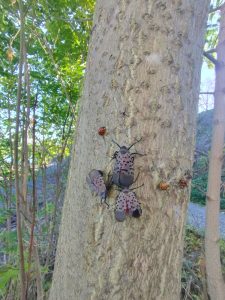By Sam Beck-Andersen, Coordinator, Finger Lakes Partnership for Regional Invasive Species Management
Keep an eye out for spotted lanternfly! Spotted lanternfly (Lycorma delicatula) is an invasive insect from Asia that feeds on dozens of plants found here in the Finger Lakes, including grapes, apples, maple and walnut trees, and more. This pest sucks sap from host plants and secretes honeydew, which in high concentrations can cause black sooty mold that damages plants.
Last fall, Finger Lakes Partnership for Regional Invasive Species Management (PRISM) staff were the first to identify spotted lanternfly in Ontario County on the Hobart and William Smith Colleges campus, right down the street from their offices at the Finger Lakes Institute. New and significant populations in the Finger Lakes region have been identified in 2025 and have garnered interest and concern from local grape growers and other stakeholders.
Finger Lakes PRISM staff have been working closely with Cornell Integrated Pest Management and Finger Lakes Grape Program teams, NYS Department of Environmental Conservation, and NYS Department of Agriculture and Markets to track and respond to new populations in the area. This invasive insect is on the rise in the Finger Lakes, and you can help managers track its spread. While active management methods for grape growers are available, the public can also help to support the efforts to address spotted lanternfly in the Finger Lakes by reporting sightings. Head over to Cornell IPM’s spotted lanternfly page for more information about threats, life cycle, management, and reporting – https://cals.cornell.edu/integrated-pest-management/outreach-education/whats-bugging-you/spotted-lanternfly.
Also, feel free to contact Finger Lakes PRISM staff for more information: Sam Beck-Andersen, Finger Lakes PRISM Coordinator – beck-andersen@hws.edu; Lydia Martin, Terrestrial Invasive Species Program Manager – lmartin@hws.edu.

